Disney, British Gas, Beyond Meat: Everything that matters this morning
Good morning and welcome to Marketing Week’s round-up of the news that matters in the marketing world today.

Disney is putting brand value at risk claims activist investor
Disney is too focused on its bottom line and risks damaging the “brand value and long-term health of the business” claims activist investor Nelson Peltz.
The brand is too reliant on charges like increasing prices at its theme parks, Peltz claimed. He also raised concerns about the loss-making streaming business and low staff wages. According to his firm Trian Partners, spending at Disney theme parks has risen around 40% since 2019.
In a presentation, Peltz said Disney is in “crisis” and called for major changes at the media giant. He criticised decisions including “over the top” compensation to top executives and what he describes as an overpayment for the acquisition of much of Rupert Murdoch’s Fox.
Peltz is known for the interventions he makes in the companies he invests in. He has sat on boards including Unilever, P&G and Mondelez.
His request to join Disney’s board was rejected by the company. Trian Partners is now seeking shareholder support for him to take a seat on the board. In 2018, Peltz joined P&G’s board following a months-long proxy battle against the company, which was resisting him joining. The company’s stock price rose almost 90% after he joined.
READ MORE: Disney accused of squeezing theme park customers
Headlam Group hires Ufurnish’s Toni Wood as chief customer officer
Floor company Headlam Group has hired Toni Wood as its chief customer officer.
Wood joins from Ufurnish, a company which acts as a search engine for furniture and furnishings, where she was CMO. Wood held the role since June 2020 and will stay on as an advisor to the board.
“After an amazing journey building the business, marketing, people and culture foundations with the founders of Ufurnish… I am delighted to now be moving into a board advisory role,” she wrote in a post on LinkedIn announcing her move, describing her time at the company as “one of the highlights” of her career.
She also expressed her excitement to join Headlam Group, a British-based flooring company which provides the channel between suppliers and trade customers of floor coverings.
Wood was chief marketing and commercial officer at sofa brand DFS between 2016 and 2019. Prior to that, she was global brand and digital director at Costa Coffee.
As well as having experience in retail and ecommerce Wood has also worked in FMCG. She spent nine years at FMCG giant P&G and two at drinks maker Britvic. She also founded a consultancy business, Ginger consulting.
She currently serves as a non-executive board member for pawnbroker company H&T Group.
UK economy unexpectedly grows in November
 The UK economy grew 0.1% in November 2022, beating expectations as gross domestic product (GDP) was boosted by World Cup trading in pubs.
The UK economy grew 0.1% in November 2022, beating expectations as gross domestic product (GDP) was boosted by World Cup trading in pubs.
However, looking at the broader picture, the economy shrank by 0.3% in the three months to November, according to figures from the Office for National Statistics (ONS). This was largely due to the impact of the extra bank holiday for the Queen’s funeral, says the statistics body.
The services sector grew by 0.2% in November 2022. The largest contribution to the growth in consumer-facing services came from food and beverage businesses, which grew by 2.2%. Pubs were boosted by the start of the winter World Cup in November.
Overall, the largest contributors to economic growth in the month were from administrative and support service activities and information and communication.
“This was partially offset by further falls in some manufacturing industries, including the often-erratic pharmaceutical industry, as well as falls in transport and postal, partially due to the impact of strikes,” says ONS director of economic statistics Darren Morgan.
Top marketer at Beyond Meat departs
The top marketer at US plant-based meat substitute brand Beyond Meat has left the company.
Beth Moskowitz was chief brand officer, a role which she took on in January 2021. Before that she served as chief creative officer at the brand, which has ran into difficulties in recent times.
Beyond Meat was founded in 2009. As well as its meat substitute products being available on supermarket shelves, it has collaborated on plant-based alternatives with fast-food companies like Yum! Brands and McDonald’s. It is the brand behind McDonald’s McPlant burger.
The brand has seen its stock slump by more than 77% in the last year as top executives leave the company. Moskowitz becomes the latest departure, according to the Wall Street Journal, which quotes an internal document.
In the document, Moskowitz told employees that Wednesday was her last day. She said she remained a strong supporter of the company and that the biggest factor in her departure was spending time with her family.
Beyond Meat did not respond to WSJ’s request for comment on her departure; however, did say it has hired an executive to lead global marketing for the brand, who will begin in February.
READ MORE: Beyond Meat’s Chief Brand Officer Beth Moskowitz Leaves Company
British Gas owner forecasts eightfold earnings increase this year
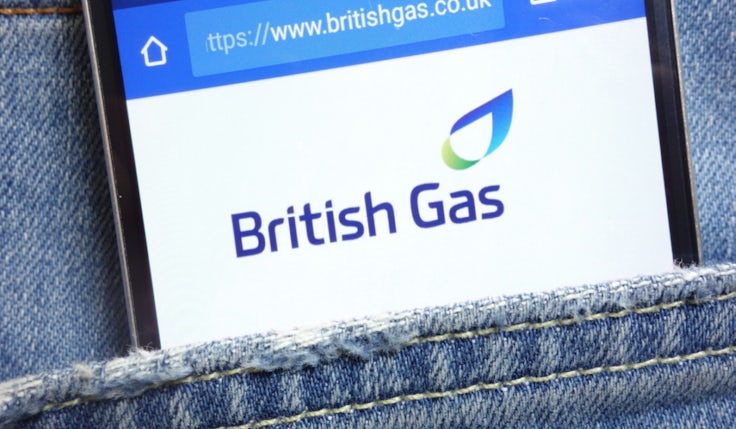
Centrica, the parent company of British Gas, has forecast earnings almost eight times higher than what it achieved last year, despite the introduction of windfall taxes.
The business upgraded its earnings forecast yesterday (12 January) to more than 30p a share. City predictions had been it would achieve 23.6p to 26.6p a share when it reports its 2022 results in February. In the 2021 financial year, 4p a share was generated; meaning the forecast figure would present almost an eightfold increase.
This is the second time in three months that Centrica has upgraded its earnings forecast and the third time this financial year. Its balance sheet has been boosted by the rise in price of wholesale gas due to the Ukraine war.
The upgraded forecast was shared in a brief update to investors in which Centrica said it had “continued to deliver strong operational performance from its balanced portfolio” and expects to have more than £1bn of cash on its balance sheet for this year.
Along with other energy companies, Centrica has been subject to two windfall taxes introduced by the government, which are designed to curb excess profits generated by these businesses as energy prices rise.
READ MORE: British Gas owner forecasts eightfold rise in earnings amid soaring gas prices
Paperchase up for sale just four months after ownership change
Retailer Paperchase is reportedly up for sale again, just four months after it was brought by investor Steve Curtis.
Curtis is a retail investor who has invested in companies such as Tie Rack and is an operating partner at turnaround company Rcapital. He took over the stationery chain in August but has now asked PwC to find a buyer for it in the next few weeks.
Sky News quotes several sources who report an insolvency process may be needed to bring about a transaction.
Paperchase went bust during the pandemic and underwent a pre-pack administration in January 2021.
When he took over the chain, Curtis reportedly supported a management plan to expand the existing store portfolio from 100 to 150 shops. The previous owner Permira Credit had also invested in new store openings, as well in the chain’s digital offering and executive team.
READ MORE: Paperchase sale on the cards again just four months after takeover
Thursday, 12 January

M&S launches ‘Value You Can Trust’ campaign
With its ‘Value You Can Trust’ campaign, M&S is hoping to reaffirm its commitment to “trusted value”.
The multichannel campaign for the brand’s clothing and home ranges highlights M&S’s essential products, such as pyjamas, bedding and jeans as it looks to promote its value.
As M&S managing director for clothing and home Richard Price says: “Now more than ever, customers want to make every penny count and when it comes to clothing, making every penny count is more than just the product’s price – they also want confidence that it is made well and made to last.”
He says the Value You Can Trust campaign is about “showcasing” what M&S has always “done best”. “It’s an honest campaign that puts value, and our values as a retailer, front and centre, at a time when it really matters to our customers.”
The initial campaign will run across stores and digital, and the value messaging from the retailer will continue beyond the campaign’s end.
Asos revenue down 3% in lead up to Christmas
 Fashion retailer Asos has reported a 3% drop in revenue over the four months to 31 December 2022.
Fashion retailer Asos has reported a 3% drop in revenue over the four months to 31 December 2022.
The company, which last year admitted to underinvesting in brand marketing and over-investing in performance, announced that it made “significant progress” in its ‘Driving Change’ agenda.
In the period leading to Christmas, sales were also down 8% in the UK, which the company says reflects a “weak consumer sentiment”.
“We are undertaking necessary strategic and operational changes, with our focus shifting from prioritising top-line growth to building a more relevant and competitive fashion business with a disciplined approach to capital allocation and ROI,” says CEO José Antonio Ramos Calamonte.
“At the same time, we are working to reinforce our credibility as a leading destination for our fashion-loving customers.”
British Gas, Britvic and Global join All In campaign as champions
British Gas, Britvic and Global have joined the All In campaign, a joint venture between the Advertising Association, the Institute of Practitioners in Advertising (IPA) and Incorporated Society of British Advertisers (ISBA).
The aim of the initiative is to build a more inclusive workforce and to better support talent in the industry. The new recruits join companies such as Channel 4, Google and Tesco, which signed up in the first wave.
The news comes ahead of the launch of the All In Census in March, where all advertising and marketing services companies working in the UK will be asked to fill out a survey to share their data. All In says the upcoming survey will this year include questions on retention and hybrid working.
“It’s brilliant to start off the year announcing the second wave of All In Champion companies, testament to the commitment from our industry towards All In’s goals,” says chair of the All In Working Group Kathryn Jacob.
Consumers are cutting back on tech and internet and at risk of digital poverty, finds Currys
 New research from Currys, the Digital Poverty Alliance (DPA) and YouGov finds 36% of UK adults have cut back on their spending when it comes to digital access.
New research from Currys, the Digital Poverty Alliance (DPA) and YouGov finds 36% of UK adults have cut back on their spending when it comes to digital access.
More than a quarter (27%) say they’ve switched to a cheaper broadband or mobile phone plan, while 19% have downgraded their phone or laptop devices, such as buying cheaper models, delaying upgrades or sharing devices between multiple people to save money.
The survey highlights fears about digital poverty. More than half (52%) of respondents say they fear missing out on essential services, such as doctors appointments, while 44% are worried about being left socially isolated – more than a third (38%) are concerned about struggling to find work.
The DPA was set up between the Learning Foundation, Currys and the Institute of Engineering and Technology with the goal of ending UK digital poverty by 2030. Alongside the survey, Currys carried out fundraising initiatives over the festive period in its stores, raising more than £70,000 to tackle digital poverty.
“While it’s important we continue to spotlight this issue via new research, it’s also critical that we provide the financial backing to help support those in digital need in the short-term. That’s why this winter, we implemented a number of fundraising initiatives to generate vital funds that will support those without access to technology,” says Currys chief people, communications and sustainability officer Paula Coughlan.
Reach to cut 200 jobs as publisher faces ‘unavoidable headwinds’
Reach, which publishes newspapers Daily Mirror and Daily Express, will cut around 200 jobs with consultations starting immediately.
The publisher shared its job cutting intentions alongside a trading update which highlighted the problems being faced by the company. In the three months to 25 December 2022, digital revenue dropped by 5.9%, while print advertising fell 20.2%.
“Near-term, economic conditions remain uncertain, creating unavoidable headwinds for the whole sector, with advertising weakness and prolonged cost inflation. The business has however established a consistent track record of disciplined cost control and efficiency savings,” the company says.
Reach is now looking to undertake a cost-saving mission in 2023 to save at least £30m. “This early action will allow us to protect our organisation and ensure we continue to deliver on our Customer Value Strategy,” a spokesperson says.
“We will continue to review all aspects of our ongoing strategic transformation to ensure we are well placed to benefit once industry trends return to more normalised levels of activity.”
The impact on marketing roles amid the job cuts is not yet known, as the National Union of Journalists says more than half of the jobs being cut will be editorial roles. Andrew Tenzer, former director of market insight and brand strategy at Reach, departed the company at the end of 2022 after six years.
Elon Musk breaks record for largest loss of personal fortune
A new Guinness World Records report suggests Elon Musk has broken the world record for the largest loss of personal wealth in history.
He’s lost an estimated £150bn since November 2021, which is being blamed on Tesla stock’s poor performance, where the majority of his wealth is tied up.
While the decline in his wealth had already started prior to his Twitter takeover, the publisher says, it accelerated after the purchase.
The report states the exact figure is “almost impossible” to determine, but that the losses are larger than the previous record holder’s, Masayoshi Son who lost £47bn in 2000.
READ MORE: Elon Musk breaks world record for largest loss of personal fortune in history
Wednesday, 11 January
Sainsbury’s hails record Christmas as own brand sales jump 10%
Sainsbury’s is crediting its investment in value, innovation and service with driving sales growth across its grocery and general merchandise categories over Christmas, as the retail group reports a 7.1% uplift in sales compared to the previous festive period.
The unusual timing of last year’s winter World Cup also helped to boost sales, the business says. Grocery sales were up 7.1% in the six weeks to 7 January, while general merchandise sales (including Argos) were up 7.4% and clothing sales increased by 5.1%.
With the cost of living crisis squeezing consumers’ wallets, overall sales of Sainsbury’s own brand food ranges jumped by 10%. Entry price product range Sainsbury’s Basics was the fastest growing sub-brand, the supermarket reports.
Meanwhile, the grocer’s premium own brand range Taste the Difference grew 10%, up 27% compared to pre-pandemic levels. Sainsbury’s launched 145 Taste the Difference products over the festive period, including a Mulled Cider Glazed Gammon Joint and a Cherry and Almond Panettone. On 4 January the supermarket launched new brand Flourish, with a focus on healthy options.
“We prioritised keeping our prices low and giving our customers great value at Christmas. We went bold on the traditional fresh turkey roast dinner with all the trimmings and dessert, which was the best value in the market at under £4 per head,” says CEO Simon Roberts.
“Sales were also boosted by the World Cup as people celebrated more at home. Our determined focus on delivering the best value alongside new and exciting festive food plus outstanding customer service and availability meant we delivered record sales, and market outperformance at both Sainsbury’s and Argos.”
Sainsbury’s will maintain its focus on value this year, launching its “biggest value campaign yet” this month and price matching discounter rival Aldi on approximately 300 products. While the business remains “cautious” about the consumer backdrop, it expects underlying profit before tax for the year to March to be towards the upper end of the guidance range of £630m to £690m.
Major Unilever investor Terry Smith takes fresh shot at brand purpose
Fund manager Terry Smith has reiterated his disapproval of Unilever’s brand purpose strategy, accusing the FMCG giant of “virtue signalling” while taking aim at the company’s soap brand Lux.
In his annual letter to shareholders, the founder of Fundsmith Equity Fund highlighted Lux’s stated brand purpose, which is ‘inspiring women to rise above everyday sexist judgements and express their beauty and femininity unapologetically’.
“I will leave you to draw your own conclusions about the utility of this,” Smith wrote, adding: “When I last checked [soap] was for washing.”
Last year Smith branded Unilever’s focus on sustainability and brand purpose as “ludicrous”, claiming the strategy led to the FMCG giant’s underwhelming performance in 2021. Smith took aim at Ben & Jerry’s refusal to sell its ice cream in Israel’s settlements in occupied Palestinian territory, as well as Unilever’s decision to define a brand purpose for Hellmann’s mayonnaise.
“A company which feels it has to define the purpose of Hellmann’s mayonnaise has in our view clearly lost the plot. The Hellmann’s brand has existed since 1913, so we would guess that by now consumers have figured out its purpose (spoiler alert — salads and sandwiches),” he wrote at the time.
A month later, Unilever highlighted the superior growth of Ben & Jerry’s, Hellmann’s and Dove in its 2021 fiscal year. Dove experienced its fastest growth in eight years at 8%, while CEO Alan Jope called out Hellmann’s 11% growth and Ben & Jerry’s 9% growth as “key performances” within the group.
However, in this year’s letter Smith said linking brand purpose with brand growth “confuses correlation with cause and effect”.
“There is no control in that experiment; we don’t know how well it would have grown without the virtue signalling ‘purpose’,” he said. “There may be a positive correlation between stork sightings and births but that doesn’t prove that one causes the other. Maybe Hellmann’s would be growing as fast or even faster without its ‘purpose’.”
Unilever’s mission to put purpose at the heart of all its brands began in 2018, after finding that its purpose-driven brands were growing at a faster rate. The company’s 28 ‘Sustainable Living’ brands grew 69% faster than the rest of the business, up from 46% in 2017, and delivered 75% of Unilever’s overall growth that year.
Sales of JD Sports owner jump by more than a fifth over Christmas
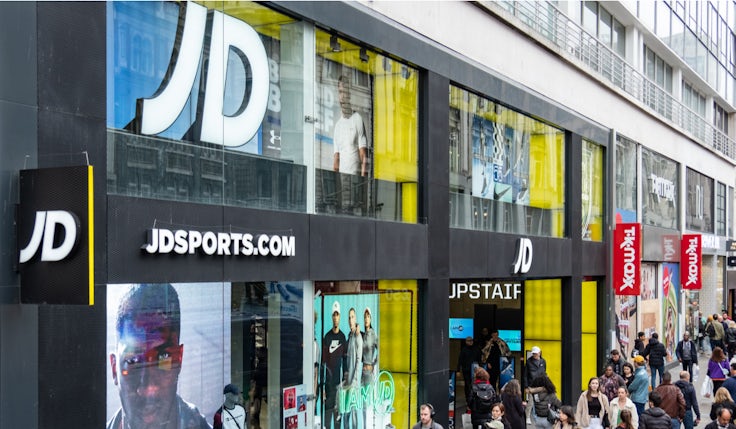 JD Group, parent company of sports retail giant JD Sports, grew its revenues by more than 20% in the six week period to 31 December, with sales growth both in stores and online.
JD Group, parent company of sports retail giant JD Sports, grew its revenues by more than 20% in the six week period to 31 December, with sales growth both in stores and online.
Revenues for the entire second half of its fiscal year grew more than 10%, the business reports in a trading update today (11 January). In comparison, JD Group saw growth of just 5% in the first half.
As well as flagship brand JD Sports, the group owns retail brands including Size?, Footpatrol and Shoe Palace. Growth has been particularly strong in North America, up by over 20% during the second half to date. The UK and Ireland, Europe and Asia Pacific maintained their first half momentum, with the business deeming this “reassuring” and evidence of the “enduring strength” of its multi-channel consumer engagement.
The business now expects headline group profit before tax for the year ending 28 January to lean towards the top end of expectations, which range from £933m to £985m. Next year, the group estimates it will reach profit of over £1bn.
“The engagement and commitment of our teams through the peak trading period has been phenomenal with many of our stores and websites delivering record sales and JD’s market-leading product and retail experience capturing the imagination of customers globally like never before,” says CEO Régis Schultz.
“Our strategic focus on the international and digital expansion of our global premium sports fascias is underpinned by the continued strength of these businesses.”
Facebook and Instagram tighten restrictions around advertising to teens
Facebook and Instagram are introducing new restrictions limiting the data advertisers can use to target teenagers on their platforms, parent company Meta has said.
After removing advertisers’ ability to target teens based on their interests and activities last year, Meta now plans to remove gender as a targeting option in March. As a result, advertisers will only be able to target teens using their age and location.
The ads teenagers see will also no longer be informed by their engagement on the company’s platforms, whether that’s liking Instagram posts or following Facebook pages.
At the same time, Meta will introduce new capabilities allowing teenagers to manage the types of ads they see on Facebook and Instagram, such as choosing to see fewer ads about a genre of TV show. They can continue to choose to hide any or all ads from a specific advertiser.
“We recognize that teens aren’t necessarily as equipped as adults to make decisions about how their online data is used for advertising, particularly when it comes to showing them products available to purchase,” Meta explained in a blog post.
“For that reason, we’re further restricting the options advertisers have to reach teens, as well as the information we use to show ads to teens.”
Evian-owner Danone hit with lawsuit by environmental activists
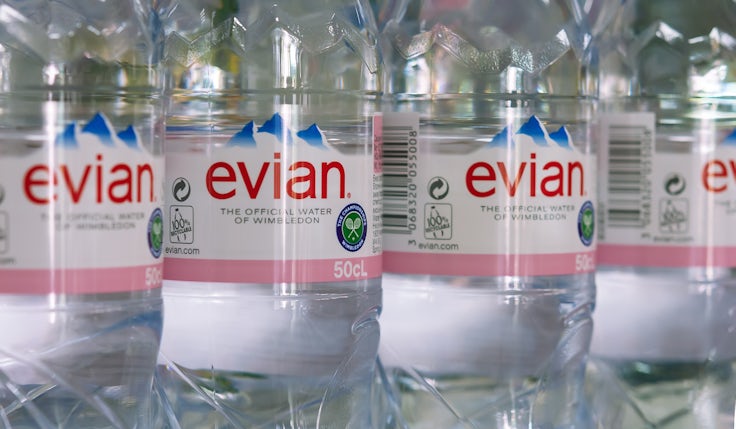 French bottled water and dairy business Danone is facing a lawsuit from three environmental groups, which are accusing the firm of violating French law by not sufficiently identifying and reducing the amount of plastic in its products and production line, the Guardian reports.
French bottled water and dairy business Danone is facing a lawsuit from three environmental groups, which are accusing the firm of violating French law by not sufficiently identifying and reducing the amount of plastic in its products and production line, the Guardian reports.
Environmental groups Surfrider, Zero Waste France and ClientEarth filed the lawsuit in Paris this week. According to the country’s “duty of vigilance” law, large companies must put in place a “vigilance plan” outlining their environmental and social impacts.
However, ClientEarth lawyer Rosa Pritchard says Danone lacks a “serious plan” to deal with plastics, adding that its vigilance plan was “entirely silent” on the matter. As such, the three groups are calling for judges in a Paris civil court to force the company behind bottled water brands Evian and Volvic to produce a new plan within six months, outlining a plan to reduce its plastic use.
In a statement Danone said it is “very surprised” by the lawsuit, refuting the accusation made by the groups.
“Danone has long been recognised as a pioneer in environmental risk management, and we remain fully committed and determined to act responsibly,” the business said.
“We are implementing a comprehensive framework of actions aimed at reducing the use of plastic, developing reuse, strengthening collection and recycling schemes, and developing alternative materials. We have already made significant progress on each of these fronts, particularly on plastic reduction, with, for example, a decrease of 12% at global level (60,000 tons in absolute) between 2018 and 2021.”
In 2018, Danone announced it aims to make 100% of its packaging recyclable, reusable or compostable by 2025. However, a brand audit report in December saw Danone identified as one of the world’s top 10 plastic polluters, alongside Nestlé, Coca-Cola and PepsiCo.
READ MORE: Activists sue French food firm Danone over use of plastics
Tuesday, 10 January
Former McDonald’s boss fined $400,000 for misconduct
McDonald’s former CEO and marketer, Steve Easterbrook, has been fined $400,000 ($328,000) for misleading investors about a relationship he had with an employee while in charge.
Easterbrook was fired by the fast food chain in 2019, after admitting he had “demonstrated poor judgement” and violated the brand’s rules on relationships between staff.
He has now been fined by the US Securities and Exchange Commission (SEC) for “concealing the extent of his misconduct” and making “false and misleading statements to investors about the circumstances leading to his termination”.
As part of his “separation agreement” the SEC said Easterbrook received more than $40m, but it believes both McDonald’s and the former CEO were not honest about the reason for his departure. This allowed Easterbrook to “retain substantial equity compensation that otherwise would have been forfeited”, the regulator said.
“When corporate officers corrupt internal processes to manage their personal reputations or line their own pockets, they breach their fundamental duties to shareholders, who are entitled to transparency and fair dealing from executives,” says Gurbir Grewal, the director of the SEC’s division of enforcement.
“By allegedly concealing the extent of his misconduct during the company’s internal investigation, Easterbrook broke that trust with – and ultimately misled – shareholders.”
READ MORE: Former McDonald’s boss fined $400,000 over employee relationship
Disney boss orders staff to return to office four days a week
Disney boss Bob Iger has ordered staff currently working remotely to return to the office four days a week, suggesting face-to-face collaboration is critical for “a creative business like ours”.
In a staff memo seen by the BBC, he said: “It is my belief that working together more in-person will benefit the company’s creativity, culture and our employees’ careers.”
He underlined this point again, stating “nothing can replace the ability to connect, observe and create with peers that comes from being physically together”, adding that being in the office also gives employees more opportunity to “grow professionally” by learning from leaders and mentors.
Iger, who returned to Disney less than a year after retiring after its share price tumbled, has mandated that hybrid staff now work Monday to Thursday in the office and treat these days as “in-person workdays”.
READ MORE: Disney boss calls for workers to return to office four days a week
Lidl GB enticed 1.3 million more customers through its doors last Christmas
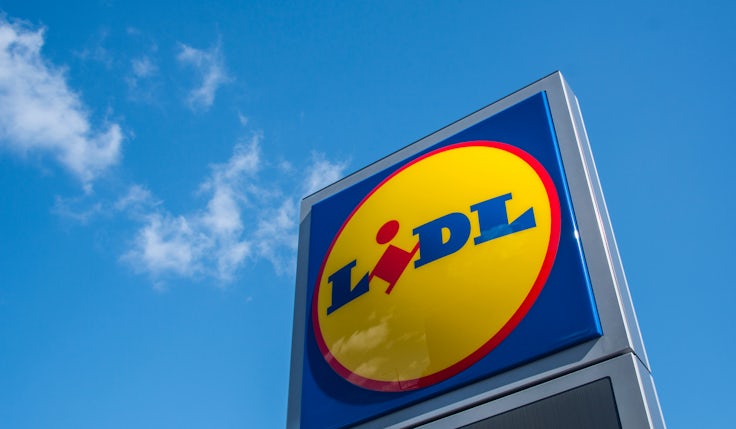 Lidl GB attracted more than 1.3 million additional customers through its doors last Christmas as the cost of living crisis continues to impact people’s shopping behaviour.
Lidl GB attracted more than 1.3 million additional customers through its doors last Christmas as the cost of living crisis continues to impact people’s shopping behaviour.
The discounter claims consumers switched £62.8m of spend from other retailers, which is nearly three times more compared to the same period in 2021.
This helped Lidl GB increase sales by 24.5% year on year and lead to the retailer recording its “busiest ever” day of trading on 23 December.
Ryan McDonnell, CEO of Lidl GB, says: “Our strategy – great quality products at low prices – has remained the same since we first opened our doors over 28 years ago. But that is only because it’s as relevant now as it ever has been.
“It is working because we are seeing big switching gains with over £63m of spend moving to us in the four weeks to 25 of December. We only see this momentum continuing in 2023.”
He says the supermarket is now “laser-focused on strengthening” its infrastructure in the UK, with plans to expand two of its distribution centres and open its biggest ever warehouse in Luton.
“This doubles down on our efforts of giving more communities access to our unrivalled quality-value combination, something that’s particularly important as families continue to tighten their belts in the current climate.”
TikTok undercuts Instagram on ad prices in its race for growth
TikTok is undercutting rivals including Instagram, Twitter and Facebook by offering cheaper ad space as it looks to steal a larger chunk of the digital ad market, according to analysis by the Financial Times.
The rapidly-growing social media platform, which now has more than 1 billion users worldwide, is reportedly offering 1,000 impressions for video advertising for almost half the price of Instagram Reels, 2022 data from VaynerMedia shows. TikTok’s ad rates are also a third cheaper than Twitter and 62% lower than Snapchat, the figures shared with the FT show.
Meanwhile, from September to October last year alone the top 1,000 advertisers in the US increased their spending on TikTok by 66% to $467m, according to data from Pathmatics.
TikTok has quickly become a place for brands to engage young, hard to reach consumers, with Snapchat, Instagram and Facebook book owner Meta and YouTube owner Google all launching lookalike short-form video offers.
Last year, Marketing Week columnist Mark Ritson said TikTok’s rivals won’t be able to beat it by simply cloning what it does, however.
“Of all the many disadvantages of competitor orientation, the biggest one is that it inhibits and ultimately destroys a company’s own strategic capability,” he said. “When you look at your rival and adopt its approach, you look less and less at your own situation, advantages and options. The more a company copies a competitor’s strategy, the more it loses the ability to create its own.”
However, TikTok, which is owned by Chinese firm ByteDance, has raised concerns over security among global regulators and its boss is meeting with European competition chief Margrethe Vestager today.
READ MORE: TikTok undercuts social media rivals with cheap ads in battle for growth (£)
Campaign launched to ‘raise the alarm’ on ethnicity pay gap
 Non-profit charity People Like Us has subverted The Conservative’s 1970s ‘Labour Isn’t Working’ ad to highlight the pay inequality ethnic minority workers in the UK are facing.
Non-profit charity People Like Us has subverted The Conservative’s 1970s ‘Labour Isn’t Working’ ad to highlight the pay inequality ethnic minority workers in the UK are facing.
The reimagined ad shows a line of people from black, Asian, mixed race and other minority ethnic backgrounds queuing for a pay rise under the banner “People like us are working. But getting paid less.”
It comes as research reveals ethnic minority workers are paid 16% less than their white counterparts on average. In light of this, the campaign is also calling for people to make ethnicity pay gap reporting mandatory as it now is for gender. The ad urges the British public to sign a petition to make it compulsory.
The campaign launch follows Prime Minister Rishi Sunak’s speech last week during which he said creating better paid jobs and opportunities across the country is a priority for growing the economy.
Sheeraz Gulsher, co-founder of People Like Us says: “Since gender pay gap reporting was introduced in 2017, the gender pay gap has decreased – it’s still there, but it’s gradually moving in the right direction as businesses put more action behind equality. We want the same principles to be applied to workers from an ethnic minority background.
“Mandatory ethnicity pay gap reporting will allow businesses to have a clear snapshot of how workers are paid, enabling them to address discrimination head-on. Businesses must be held to account publicly and workers deserve to know where they stand in terms of pay.”
The creative was developed by Tom Lee at Media Bounty, who worked with People Like Us on a pro bono basis, as did VCCP, PrettyGreen, Hope&Glory PR and The Romans.
Monday, 9 January
 McDonald’s seeks to ‘elevate’ marketing as part of wider revamp
McDonald’s seeks to ‘elevate’ marketing as part of wider revamp
McDonald’s is planning to “elevate” its marketing through an investment in “creative excellence”, part of a wider revamp that sees the fast-food giant cut jobs in a bid to accelerate its modernisation.
The business says it wants to create more “culturally relevant campaigns” such as ‘Famous Orders’ from 2020, which asked stars including Kim Kardashian and Millie Bobby Brown to describe their ‘go-to’ McDonald’s order. The company claims this campaign drove growth and elevated the “entire brand”.
“We will continue leaning into that strategy and scale platforms across markets to find new ways to tap into the zeitgeist and have fun with our customers,” the fast-food chain said in a statement.
According to McDonald’s, global CMO Morgan Flatley will be involved in leading elements of the evolved strategy, the intention being to “capture opportunities for growth” and modernise ways of working.
The revamp will likely mean job cuts, with CEO Chris Kempczinski telling employees the company is suffering from an “outdated and self-limiting” structure. Staff levels will be reviewed by April, with the McDonald’s boss citing “difficult discussions and decisions ahead.” According to the BBC, certain projects will also cease, although details are yet to be confirmed.
Kempczinski claims the revamp will help the brand move faster and free up resources to invest in growth. He confirmed in an interview with the Wall Street Journal that some jobs will move, while others will be cut completely.
McDonald’s reported a 9.5% rise in global sales year on year in its third quarter results in October. Given digital represents more than a third of systemwide sales across its top six markets, McDonald’s intends to create a more “personalised and convenient experience” for customers, including serving relevant offers to increase engagement.
This digital push will link up with the MyMcDonald’s Rewards loyalty programme, now running in more than 50 markets worldwide. The UK version of the loyalty scheme hit 3 million active members within its first three months.
The fast-food chain also wants to accelerate restaurant openings to capture increased demand, including testing new concepts such as the order ahead lane at its new restaurant in Texas, which sees drive-thru customers receive their orders via a conveyor belt.
From a menu perspective, McDonald’s intends to focus on improving its classics, while also building on the global success of products such as the McCrispy Chicken Sandwich.
READ MORE: McDonald’s plans corporate job cuts and restructuring
Twitter makes ‘deeper cuts’ to content moderation teams
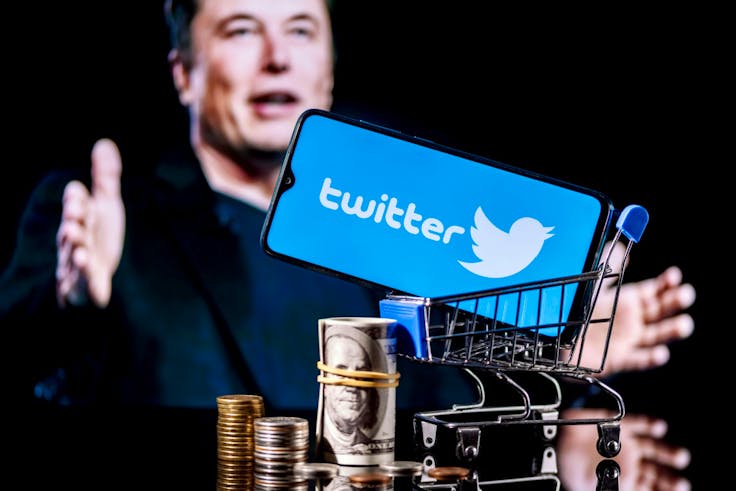
Twitter has reportedly sacked more staff responsible for managing content moderation, hate speech and misinformation in a round of “deeper cuts” to its trust and safety teams.
According to Bloomberg, the social media company has cut at least a dozen roles at its Dublin and Singapore sites. Anonymous sources confirmed to Bloomberg that Twitter’s senior director of revenue policy, Analuisa Dominguez, and recently hired head of site integrity for the Asia-Pacific region, Nur Azhar Bin Ayob, were among the employees sacked.
It is understood staff with responsibility for misinformation policy, global appeals and state media were also sacked, the Guardian reports.
Twitter’s head of trust and safety, Ella Irwin, told Bloomberg the cuts are a move to “consolidate teams under one leader”, adding that roles had been removed where the company felt it “did not have enough volume to warrant support.” According to Irwin, the social media platform will retain a head of revenue policy and head of trust and safety for the Asia-Pacific region.
Questions remain, however, over the safety of the platform under new owner and CEO Elon Musk.
In December, Twitter dissolved its Trust and Safety Council moments before the advisory group of almost 100 independent civil and human rights organisations were set to meet. There were also reports former head of trust and safety Yoel Roth, who resigned in November, had been forced to flee his home and go into hiding following a series of threats.
Last month, Reuters also reported Twitter had removed its #ThereIsHelp feature, offering resources to people looking at content on topics such as suicide, mental health and child sexual exploitation, on the personal orders of Musk. The feature was restored days later following a public outcry.
READ MORE: Twitter reportedly makes more cuts to online safety teams
Ad industry mourns passing of Jeremy Bullmore
The advertising industry is mourning the passing of former J. Walter Thompson and WPP boss Jeremy Bullmore, who died peacefully at home last week at the age of 93.
Bullmore joined J. Walter Thompson in 1954 as a trainee copywriter, the start of a 33-year career at the agency. By 1961, Bullmore was group head of copy, before being appointed head of the creative department in 1964. He served as chairman of the agency from 1976 until 1987, before leaving JWT to become director of the WPP Group. Bullmore joined the new WPP advisory board in 2004, before retiring from the agency in 2021.
Working for a variety of high-profile brands throughout his career, Bullmore created campaigns for the likes of Guinness, Kellogg’s, Kraft, NatWest, Campari, Mr Kipling and Persil. A prolific writer, WPP created ‘The JB Room’ at its headquarters in London to act as a physical library of his writing.
Aside from his client facing work, Bullmore held numerous roles in the wider industry, beginning with his appointment as chairman of the Advertising Association in 1981. Awarded a CBE in 1985 for his services to the advertising and creative industries, Bullmore served as non-executive director of the Guardian Media Group from 1988 to 2001.
Named president of NABS in 1998 – a role he would hold until 2001 – Bullmore created Fast Forward, an annual training scheme designed to equip the industry’s future leaders with the skills needed to implement marketing communications in a complex media landscape.
From 2004 to 2009, Bullmore then served as president of the Market Research Society and was awarded the Advertising Association’s Mackintosh Medal in 2011, which honours those who have given outstanding service to the advertising industry over the course of their career.
Describing Bullmore as one of the most “admired, loved and cherished people” in the advertising industry, WPP CEO Mark Read also credits the former agency boss with being one of the “most influential figures in modern advertising”.
“He not only helped to launch countless brands and careers, he also elevated the business of advertising as a whole with his depth of insight, forensic analysis and always original commentary on what we do,” says Reed. “We all owe him a great deal.”
Natural History Museum slammed for clause ‘preventing criticism’ of energy company sponsor
The Natural History Museum is under fire for signing a “gagging clause” preventing the institution from criticising a fossil fuel firm that began sponsoring its wildlife photography competition in 2016.
According to the Observer, under its current contract the Natural History Museum cannot “make any statement or issue any publicity which may reasonably be foreseen as discrediting or damaging the reputation” of its Danish energy company sponsor.
Investigative journalism organisation Point Source revealed the clause was put in the contract in 2016 when the company was known as Dong Energy and “heavily invested” in oil and gas. The business changed its name in 2017 to Ørsted when it moved away from fossil fuels to focus on renewables.
Ørsted – then Dong Energy – signed the deal to sponsor the Natural History Museum’s Wildlife Photographer of the Year competition in 2016, a partnership which runs until September 2023.
The Observer highlights a section of text from the 2016 exhibition, describing an image of a bird searching for fish beneath an offshore oil rig. The text stated that: “Drilling for oil is not generally considered beneficial for wildlife, yet oil rigs can provide shelter and a rich food supply for many animals including Brandt’s cormorants.”
Point Source and the Observer argue the exhibition failed to provide any context about the impact drilling for oil can have on marine life. At the time of the 2016 exhibition, Dong reportedly had oil and gas businesses in the North Sea worth more than $1bn (£830m).
In a statement to the Observer, the Natural History Museum insists sponsors do not have any influence over its content, adding that while such clauses are “standard for corporate partnerships” the institution no longer uses them in new contracts.
READ MORE: Natural History Museum under fire for gagging clause with Danish oil sponsor
Dairy Milk focuses on ‘everyday generosity’ in new campaign

Cadbury is hoping to shine a light on the little moments that make people feel special in the latest iteration of its long-running ‘Generosity’ Dairy Milk brand platform.
Developed by creative agency VCCP, ‘Garage’ focuses on a young woman working late at night in a petrol station. A customer pays for his petrol and a Cadbury Dairy Milk bar, which he ‘accidentally’ leaves behind.
When the girl reminds the customer he has left the chocolate treat, the man smiles and walks away. The viewer then hears an affectionate “Love you Dad” over the PA system on the forecourt, before the father smiles at her and gets into his car.
The creative idea is intended to link back to the brand’s famous recipe – every half a pound of chocolate contains half a glass of milk – as well as the notion there is generosity in everyone, which can be shown in small moments. Garage builds on earlier campaigns spanning the four years the brand platform has run to date, including ‘Mum’s Birthday’, ‘Fence’ and ‘Bus’.
The 60-second film will run until 22 January, while 30 and 20-second versions will also air across TV, cinema, broadcaster-video-on-demand and YouTube until 5 February.
“In this latest film we have introduced lighter moments, while still retaining the authenticity from our other stories that have shown how powerful moments of generosity can be,” says Cadbury UK and Ireland associate marketing director, Gemma Flanigan.
“This fits in with the campaigns we have done for the last five years that showed different types of generous givers and how small gestures can make a difference.”
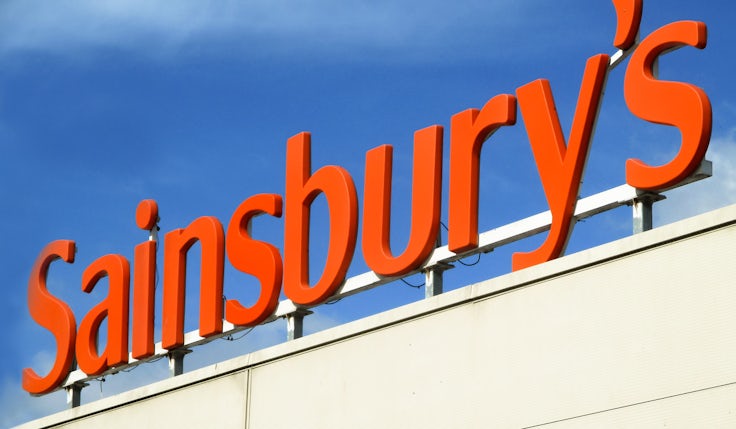

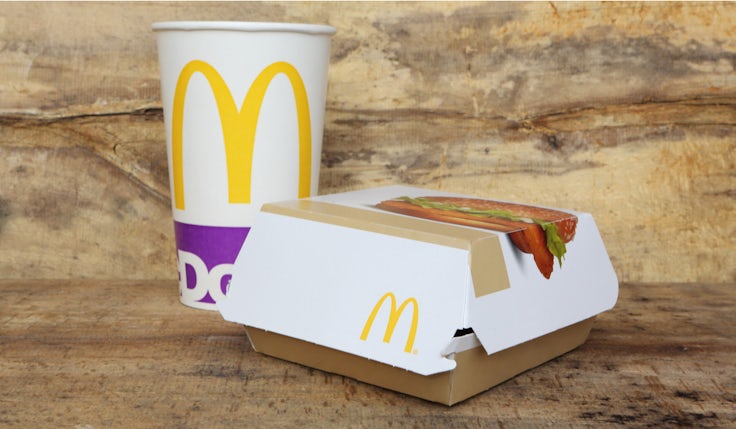 McDonald’s seeks to ‘elevate’ marketing as part of wider revamp
McDonald’s seeks to ‘elevate’ marketing as part of wider revamp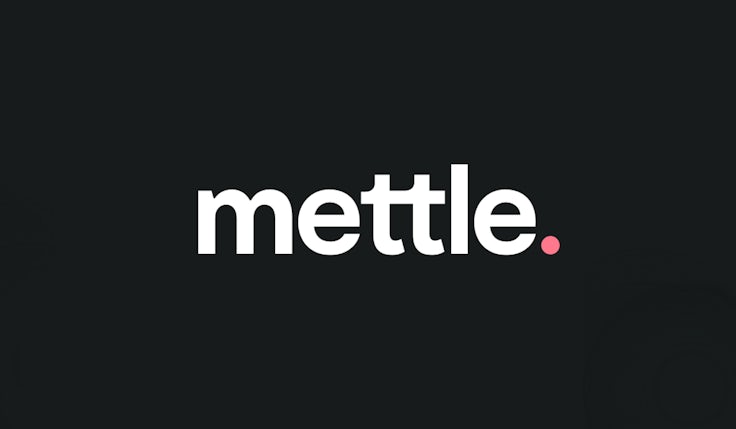






Comments